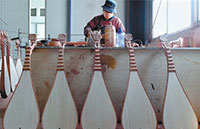Cheating students will face severe punishment
By ZHAO XINYING (chinadaily.com.cn) Updated: 2015-11-26 20:04The Chinese Ministry of Education is considering including punitive measures for academically dishonest behavior in national college administrative rules, expressing a resolution to foster a stronger sense of academic honesty among Chinese students.
Colleges and universities should set up academic honesty records for students, noting any dishonest behavior, whether it be plagiarism in theses or cheating in exams, according to draft guidelines released by the ministry on Wednesday.
"A system will be established to punish those who perform academic dishonesty, and the punishment will range from a warning to being expelled from school," the ministry said, adding that colleges and universities should also conduct honesty education.
This is the first time the ministry has issued detailed rules on academic honesty targeted at college students, after incidents of students being dishonest in academia both in and outside China were exposed.
Chu Zhaohui, a senior researcher at the National Institute of Education Sciences, said academic dishonesty has been so severe an issue that it has started to damage the reputation of Chinese students studying overseas.
A report released in June by WholeRen Education, a United States-based agency that provides services to Chinese students, showed about 8,000 studying at universities and schools in the US were expelled in 2014, with 23 percent kicked out for cheating or plagiarism .
This year, from August to October, hundreds of Chinese students' results of international tests, including the International English Language Testing System and Secondary Scholastic Admission Test, were cancelled under suspicion of breaching test rules.
The situation is no less severe at home. In January, the doctor's degree of a female graduate was cancelled by her Alma Mater Peking University, as the graduate was suspected of having plagiarized an academic paper she published on a renowned domestic journal.
All incidents caused a stir among Chinese, forcing people to realize the importance of getting things back on the right track. In Chu's eyes, what the education ministry did is a step forward, yet he thinks it is still a fair way from the root of the problem.
"Dishonesty, including academic dishonesty, does not just exist among students; it is, to some extent, a habit deeply rooted in adult society," he said. "I think fostering an honest atmosphere and setting up a comprehensive credit system connecting aspects of social life may be a more effective approach to change that situation".
- Plan predicts only 10 percent of Beijing seniors will need nursing home care
- 'Falls' one of top causes of death for Chinese men: Lancet
- 91 suspects repatriated in past year
- Govt move to Tongzhou set for 2017
- Reforms may end 20-year legal fight
- University officials punished for extravagance
- Largest coal mine identified in east China
- Three local officials under graft investigation
- 13m unregistered people to be given hukou recognition
- New ship to ferry supplies to S. China Sea







